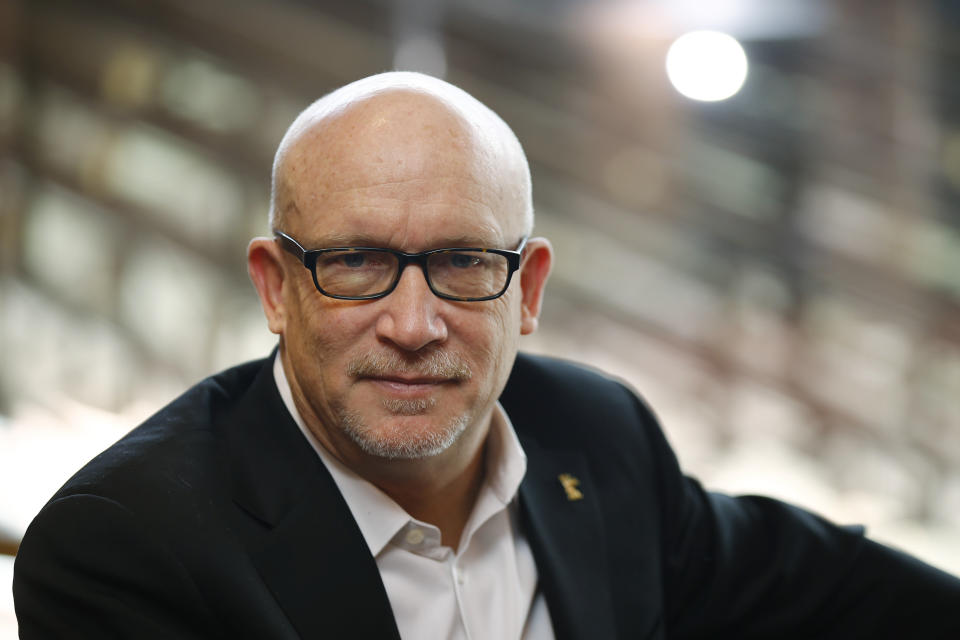Theranos documentary maker: Elizabeth Holmes suffered from a 'delusion'
Thanks to disgraced entrepreneur Elizabeth Holmes, black turtlenecks may never be seen quite the same way again.
Holmes, who founded the Palo Alto-based startup Theranos and channeled Steve Jobs in fashion and form, dangled a tantalizing vision to the world, one where Theranos’s so-called Edison machines could run over 200 diagnostic tests off a single drop of blood at a fraction of the price in a fraction of the time of traditional blood tests. But as shown in HBO’s chilling documentary, “The Inventor: Out for Blood in Silicon Valley,” premiering March 18, Holmes couldn’t back up promises of revolutionizing healthcare with technology that actually worked. Worse still, the Stanford University dropout allegedly kept up the illusion for years, lying to investors, imperiling patients’ health, and failing to show remorse through it all, according to reports from The Wall Street Journal and Vanity Fair. It’s a cautionary tale of Silicon Valley’s “fake it ‘til you make it” philosophy taken to the worst of extremes, one that has spawned armchair psychiatric diagnoses about Holmes.
Yahoo Finance recently sat down with the documentary’s director, Alex Gibney, who offered insights into the 35-year-old entrepreneur’s character.
A narcissistic streak

“I don't like to label people because I'm not a psychologist,” says Gibney, the Oscar-winning documentarian who also directed “Enron: The Smartest Guys in the Room” and the TV series documentary “Dirty Money.” “But I do think that in terms of her [Holmes], she's clearly not upset by the ethical boundaries that she crossed, and she clearly did much of what she did at Theranos for her own benefit, but also for the benefit of this larger mission. That's a kind of delusion that I've seen often with, and I would say she's narcissistic.”
Gibney hypothesizes that Holmes subscribes to “noble cause corruption,” actions considered unethical in law enforcement and often applied to so-called “dirty cops” who skirt the law to achieve what they believe to be a noble outcome.
“It's something you often see and something I'm fascinated by,” Gibney explains. “When you imagine or you believe in a legitimately good cause, you think that you're entitled — and I would use that word with Elizabeth — you think that you're entitled to shortcuts to unethical behavior, because you're doing it in the service of a good cause.”
When Holmes founded Theranos in 2003, her pitch for a cheaper, faster blood test system galvanized investors and the media. She graced the covers of Fortune, Forbes, and Inc. At one point, the company fetched a $9 billion valuation.
But Holmes’s vision far outstripped reality. The truth, as Gibney’s documentary illustrates, was that the Edison devices were incapable of successfully carrying out patient blood tests.
At one point in the film, employees paint a scene in which potential investors have their fingers pricked for blood in a room of Edison devices and are ushered out for a campus tour. Employees, meanwhile, rushed their blood samples to another room for tests on more standard lab devices. The revelation is comical and horrifying.
An unswerving facade

Through it all, however, Holmes maintained an unswerving facade that everything at Theranos was going according to plan. But in the process she burned through $900 million from investors. Wall Street Journal reporter John Carreyrou chronicled Theranos’s missteps and deceptions in a sobering expose in 2015. She was indicted on fraud charges in June and pleaded not guilty.
“What was really interesting to me about this story was not just the particulars of the fraud, but the psychology behind the fraud, the deception that Elizabeth practiced, but also the self-deception that she practiced in order to be able to lie as effectively as she did,” Gibney explains. “And then there was the psychology of the journalists who promoted her and the investors who dropped so much money on her or nearly $900 million without ever looking at an audited financial statement. So in a way, what this film is about is about the mind.”
These days, Holmes is living a lower-key existence in San Francisco, engaged, residing in a luxury apartment in San Francisco, and looking fairly “chirpy” and “chipper,” according to Vanity Fair.
“I don't think she really believes deep down in her heart that she did much of anything wrong,” adds Gibney. “Certainly, that's the way it seems from the outside, which is a really kind of a staggering development. But I think that attitude is enabled by some of the attitudes around Silicon Valley, the whole idea is ‘fake it ‘til you make it’ and ‘move fast break things,’ that you know, you've got to be a disruptor in order to be able to be a success. So you don't look back, you don't suffer any regret, you just move forward. And now she has her boyfriend, by all accounts is they’re behind a new self-driving car startup. So she's back on the saddle again.”
Holmes, according to Gibney’s representatives, has not seen documentary. Her attorneys did not respond to Yahoo Finance’s request for comment about the film.
More from JP:
